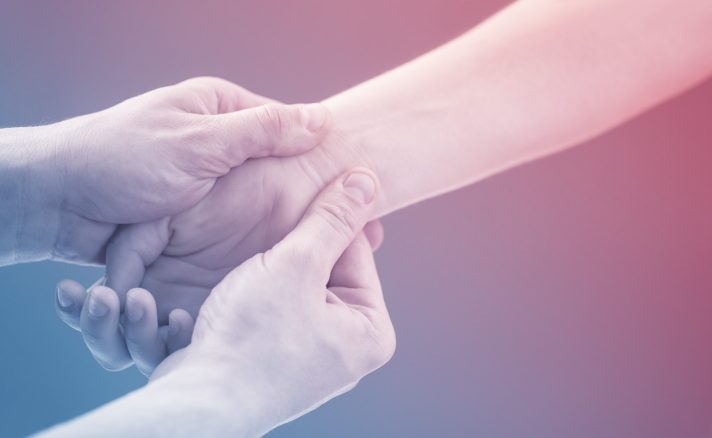Acupressure is a traditional healing practice originating in China as far back as 2000 BCE. It is based on the principles of Traditional Chinese Medicine (TCM) and involves the application of manual pressure to specific points on the body, called acupoints or pressure points.
Not to be confused with acupuncture, which employs thin needles to target acupoints, acupressure shares the same goal of stimulating the body’s energy flow or ‘qi‘ (pronounced ‘chee’) to restore balance and promote natural healing. An acupressure practitioner does this by applying pressure with their fingers, elbows, or specialized tools to stimulate these points.
An underlying premise of TCM is that the body has interconnected meridians or energy pathways. Along these meridians, there are numerous acupoints that can become blocked, causing energy imbalances that result in health issues like chronic pain, anxiety, and digestive distress. By stimulating these points with manual pressure, acupressure aims to release these blockages, restore balance, and improve overall health.
Acupressure has some similarities to Shiatsu, another popular bodywork with roots in TCM. Shiatsu usually employs deep, sustained pressure, while acupressure can have sustained pressure, a repeated pumping action, or pressure applied while moving in small circular motions.
What Health Issues Can Acupressure Address?
During an acupressure session, the practitioner will conduct an intake to assess their client’s condition, which will determine the specific acupoints to be targeted. So what can acupressure do for you?
Stress and Anxiety
Acupressure can help alleviate tension, thereby reducing overall stress and anxiety levels. Some commonly targeted points include Pericardium 6 (P6) and Large Intestine 4 (LI4).
Headaches and Migraines
Applying pressure to key acupoints, like the Gallbladder 20 (GB20) and Bladder 2 (BL2), can alleviate headaches and migraines by reducing muscle tension and stimulating blood flow.
Musculoskeletal Pain
Acupressure can help with pain relief for many musculoskeletal issues, including back, neck, and shoulder pain. Acupoints like Bladder 23 (BL23) and Gallbladder 21 (GB21) are commonly targeted to address these concerns.
Digestive Problems
Issues like indigestion, bloating, and constipation can be addressed with acupressure by stimulating points like Stomach 36 (ST36) and Conception Vessel 6 (CV6).
Sleep Disorders
Acupressure can help promote relaxation and improve sleep quality by targeting points like Heart 7 (HT7) and Pericardium 6 (P6).
Can You Add Acupressure to a Regular Massage?
In a word, yes! While there isn’t a broadly recognized certification for acupressure as a standalone practice, many massage therapists are experienced in its techniques, particularly if they’ve studied TCM, Eastern medicine, or other complementary and alternative medicine (CAM). Since acupressure is a form of manual therapy, it goes hand in hand with the broader practice of massage.
If you’d like to add acupressure work to a massage, you can seek out a massage therapist with this experience. You should discuss your needs and concerns with the therapist, and they will work with you to establish a session plan that addresses them. Your therapists will know how to incorporate pressure point work into a broader, full-body massage.
Want to add acupressure to your Zeel massage? Be sure to add this request to the “Notes for your therapist” section while booking, and your provider will be prepared to incorporate it into your treatment.
Are There Any Contraindications?
While acupressure is generally considered safe, there are certain precautions that should be taken. Pregnant women, those with cancer, heart disease, or other severe medical conditions should consult their physician before undergoing acupressure. Additionally, acupressure should be avoided around open wounds, recent surgical sites, or broken bones.
As with any health practice, it’s essential to choose a qualified and experienced practitioner. While acupressure can be learned and practiced at home, a professional who is licensed in massage therapy and/or acupuncture will be best equipped to provide the most appropriate and effective treatment for your specific needs. And as a reminder, always consult with a qualified healthcare professional before beginning any new treatment, including acupressure.
Acupressure has shown promise in addressing numerous health concerns, such as stress, headaches, musculoskeletal pain, digestive problems, and sleep disorders. Given its non-invasive nature, it can be an invaluable component of your broader health and wellness routines.


